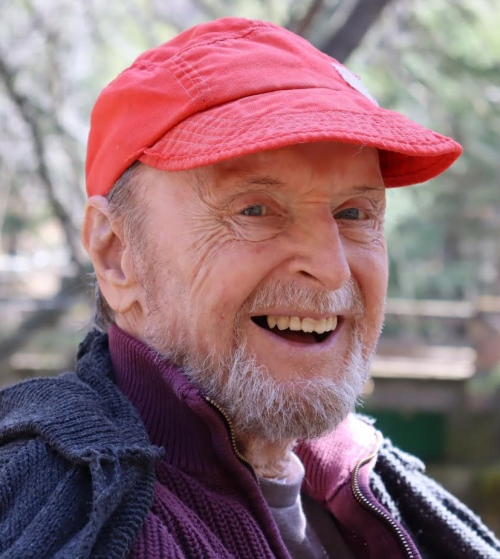In Memoriam: George B. Todd

Christian A. Johnson Professor Emeritus of Music George B. Todd
Teacher, musician, and composer George B. Todd, Christian A. Johnson Professor Emeritus of Music, of New Haven, Vermont, who brought jazz, folk music, and ethnomusicology—not to mention new approaches to the traditions of theory and musicology—to the College, died on August 27, 2021. He was 86 years old.
From the beginning, Todd was a beloved teacher who had an impact on his students. “I owe to George the awareness of my vocation as a composer. It was inspiring to have a mentor whose sympathies ranged from Mozart to Boulez,” says John Plant ’67. “I remember vividly an evening with him when he introduced me to Boulez’s now classic Le marteau sans maître; my enthusiasm was rewarded with a gift of the record he had just played for me.”
“George was creativity personified,” says Peter Hamlin ’73, Middlebury Christian A. Johnson Professor Emeritus of Music. “I still have vivid memories of the first class I took with him, Music 101, in the fall of 1969, and of learning how to make electronic music with a two-track reel-to-reel tape recorder and scavenged test equipment from the Physics Department. As a teacher, he had an uncommon gift to inspire his students to unleash our own creative passions and curiosity in our study and creation of music.”
Brought up in Evanston, Illinois, Todd didn’t immediately show a proclivity for music, claiming his parents wasted a lot of money on his piano lessons. Matriculating at Amherst College, however, he became involved in musical activities, including playing in a Dixieland band called the Delta Five; singing with the Zumbyes, a male group he arranged music for; and composing a musical called Up and Atom. After graduating, he earned an MBA at Stanford Business School then moved to Germany and did a stint with Radio Free Europe. At this point he realized that music was his life’s love and returned to earn his MFA at Princeton University.
He joined the faculty at Middlebury in 1965, becoming an assistant professor in 1967, associate professor with tenure in 1971, and full professor in 1977. In 1984 he was named Christian A. Johnson Professor of Music. During his time in the Music Department, he served many years as chair of the department.
With a love of electroacoustic music born during his Princeton years, he established the Middlebury Electroacoustic Studio in 1970 and was the director of it for years. He released several albums of his own electronic compositions and composed many pieces for performances. When the synclavier, an early digital synthesizer, began to be produced in Norwich, Vermont, it became an important part of his work. In the late 1970s, Todd took academic leave to compose a symphony, write a dramatic piece using the digital electronic equipment available at Dartmouth, and teach academic courses at Dartmouth. Over the years he maintained a strong connection with the vibrant electronic music community there.
While electroacoustic music was a passion of Todd’s, the courses he taught ranged over a wide variety of genres, from theory and analysis to composition, classical music, medieval and Renaissance music, 20th-century music, computer music, and Mozart opera. Plant says, “It seemed a dream come true to be able to devote an entire semester to the study of Don Giovanni.” In the minute read upon Todd’s retirement in 1997, it was said, “Legions of students will never hear music in the same way after having studied with George Todd. Whether it be the Nielson Symphonies, the harpsichord music of Bach, the rags of Scott Joplin, or his own wondrous electroacoustic music, George has brought his passion to the classroom. He asks us not to hear through his ears, but open our own, to find our own passion in the hearing and the making of music.”
Along with music, artistic endeavors of all varieties were important to Todd. He enjoyed reading poetry aloud. He designed and built two houses. He assisted in the founding of Middlebury’s Town Hall Theater. In retirement he took up painting. “The music he composed bristled with creative energy,” says Hamlin, “and you could see the same qualities in his visual art.”
He expended the same energy and creativity toward whatever endeavor he undertook. Son Scott says, “In his mid-40s my dad decided he was going to become a good cook of Szechuan Chinese food. He got the equipment and books and the ingredients he needed from various Chinatowns. But the way he learned was by walking back into the kitchens of Chinese restaurants and getting lessons from the cooks. I assume he asked before he went back, but he had remarkable success at it.”
His interests were wide. He enjoyed playing squash, tennis, and golf, as well as all manner of table games. He traveled all over the world with his favorite travel companions, his three children, and the wives of his two marriages, Joan Todd and Megan Battey ’79. And he found and cultivated many friendships that were important to him.
Longtime friend Bruce Peterson ’56, College Professor Emeritus, says, “George was a banquet of delights—a versatile and imaginative artist both at the keyboard and his easel, a daring chef, a deeply serious man with a reckless sense of humor. We cooked for each other, and shared good meals and good wine, as well as canoe trips and endless story-trading. He was a terrible fisherman, but absolutely essential to the 40 years we spent together trying to rid Vineyard Sound of striped bass. George loved openly. We loved him back.”
Todd is survived by sons Grey and Scott, daughter Kate, and grandsons Clayton and Jeremy. A memorial service will be held at his home in October.

